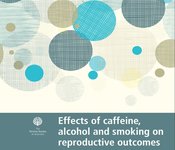Drinking alcohol can reduce a person's fertility, regardless of their gender. Even drinking lightly can reduce the chance of pregnancy.
Heavy drinking increases the time it takes to get pregnant and reduces the chances of having a healthy baby.
It is not clear how drinking small amounts of alcohol affects unborn babies but it is well known that drinking high amounts can be harmful.
Research shows that even drinking lightly can increase the time it takes to get pregnant.
MYTH BUSTING
- MYTH
A woman should stop drinking alcohol once she is pregnant, but until then there is no reason to stop.
- FACT
Drinking increases the time it takes to get pregnant and reduces the chances of having a healthy baby. For women who are pregnant or planning a pregnancy, choosing not to drink alcohol is the safest option.
The more you drink the higher the risk for the unborn baby
Binge drinking (more than six standard drinks on one occasion) can cause miscarriage, stillbirth, premature birth, small birth weight, and Foetal Alcohol Spectrum Disorder (FASD).
Drinking alcohol adds kilojoules and may lead to gaining weight, depending on the amount people drink.
Men
For men, heavy drinking can cause impotence, reduce their sex drive (libido) and their sexual performance and affect the quality of their sperm.
Women
While it is not known exactly how alcohol affects fertility in women, research shows that even drinking lightly can increase the time it takes to get pregnant, and reduce the chances of having a healthy baby.
Women who drink large amounts of alcohol (seven or more drinks a week or more than three drinks on one occasion) are more likely to have heavy or irregular periods and fertility problems.
Alcohol can also affect ovulation, which can make it difficult to conceive.
-
What you can do
The good news is that women who stop drinking alcohol while trying to conceive and during pregnancy improve their chances of having a healthy baby.
It doesn’t have to be forever!
Men can contribute to a healthy pregnancy by keeping their alcohol consumption within safe limits.
It is easier to stop drinking alcohol when the people around you don't drink. Going alcohol-free with your partner or a friend will increase your chances of pregnancy. It's also good for your baby’s health and your own health.
-
National Health and Medical Research Council recommendations
The National Health and Medical Research Council recommends that:
- no alcohol is the safest option for women who are pregnant or planning a pregnancy
- the risk of harm to the baby is highest when women drink high levels of alcohol, frequently
- the risk of harm to the baby is likely to be low if a woman has had only small amounts of alcohol before she knew she was pregnant or during pregnancy.
-
References
- National Health and Medical Research Council - Australian Guidelines to reduce health risks from drinking alcohol
- Day, J., et al. (2016). Influence of paternal preconception exposures on their offspring: through epigenetics to phenotype. American Journal of Stem Cells, 5(1), 11-18.
- Finegersh, et al. (2015). Drinking beyond a lifetime: New and emerging insights into paternal alcohol exposure on subsequent generations. Alcohol, 49(5), 461-470. https://doi.org/10.1016/j.alcohol.2015.02.008
- Homan, G. F., Davies, M. J., & Norman, R. J. (2007). The impact of lifestyle factors on reproductive performance in the general population and those undergoing infertility treatment: a review. Human Reproduction Update, 13(3), 209-223.
- Jensen, T. K., et al. (2014). Alcohol and male reproductive health: a cross-sectional study of 8344 healthy men from Europe and the USA. Human Reproduction. doi: 10.1093/humrep/deu118
- Lassi, Z., et al. (2014). Preconception care: caffeine, smoking, alcohol, drugs and other environmental chemical/radiation exposure. Reproductive Health, 11(Suppl 3), S6.
- Mínguez-Alarcón, et al. (2018). Caffeine, alcohol, smoking, and reproductive outcomes among couples undergoing assisted reproductive technology treatments. Fertility and Sterility, 110(4), 587-592. https://doi.org/10.1016/j.fertnstert.2018.05.026
- Ricci, E., et al. (2017). Semen quality and alcohol intake: a systematic review and meta-analysis. Reproductive BioMedicine Online, 34(1), 38-47. doi: 10.1016/j.rbmo.2016.09.012
- Sharma, R., et al. (2013). Lifestyle factors and reproductive health: taking control of your fertility. [Review]. Reprod Biol Endocrinol, 11(66), 1477-7827.
Page created on: 29/08/2018 | Last updated: 26/03/2025





